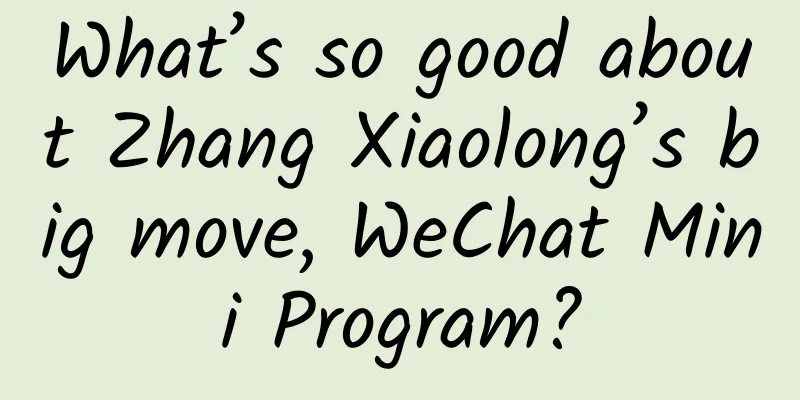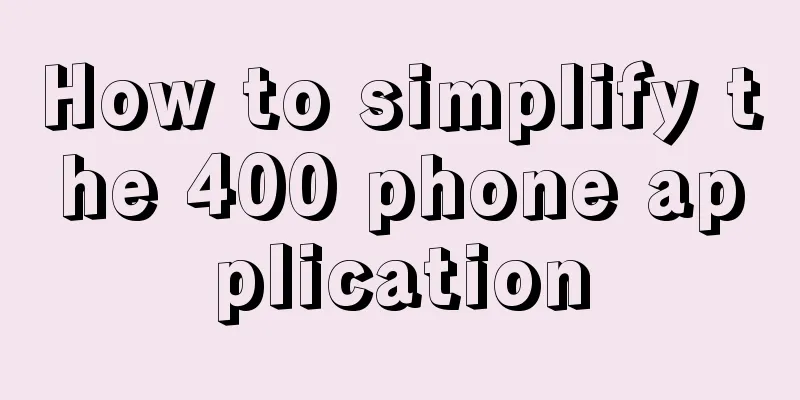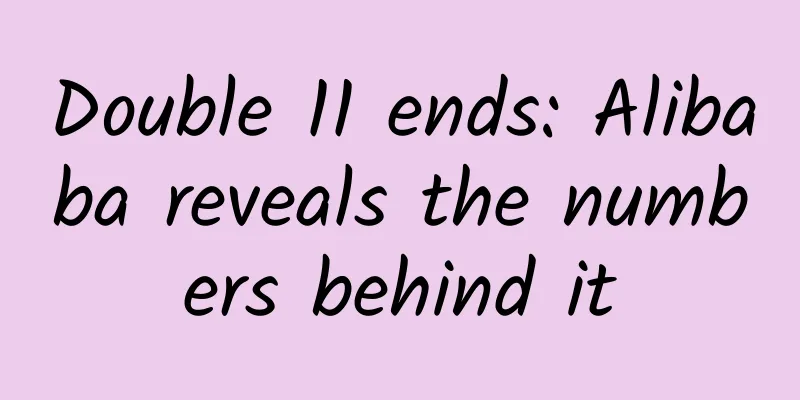What’s so good about Zhang Xiaolong’s big move, WeChat Mini Program?

|
On December 28, Zhang Xiaolong, the father of WeChat, gave a special speech on WeChat Mini Programs at the WeChat Open Class. He introduced in detail the capabilities of WeChat Mini Programs and the concept behind the Mini Programs, and announced that WeChat Mini Programs will be officially released on January 9, 2017. To summarize the speech, here are the FAQs about the mini program capabilities mentioned: - There is no entry for mini programs in WeChat. Mini programs are launched by scanning the QR code. - No mini-app store for searching and downloading - Mini Programs have nothing to do with subscription accounts - Mini Programs cannot push messages - Mini programs cannot be shared to Moments, but can be shared with friends and WeChat groups - Mini programs cannot be used to make games - Mini programs can be searched, but will be strictly restricted Through the above FAQ and the ideas behind it explained by Zhang Xiaolong, the capabilities of WeChat Mini Programs are completely consistent with my original judgment. The article I wrote in early November, "WeChat Mini Programs are Overrated", now seems to be completely accurate. Where does WeChat's power lie? "Social relationship chain". Where is WeChat's traffic entrance? "First screen conversation list" and "Friends Circle". WeChat's social relationship chain has not been opened to the public so far, and WeChat's traffic entrance has always been strictly controlled by WeChat. Let’s think about this question: “Why are WeChat subscription accounts so successful, but only a few service accounts are successful?” There are many self-media companies that rely on subscription accounts to attract millions of fans and build their own business models, but why are there almost no entrepreneurial projects that rely on service accounts? The essential reason behind this lies in traffic import: subscription accounts can post one article every day, and can share a certain amount of initial traffic from the main entrance of the "first screen conversation list". The amount of one article per day is also enough to find enough presence in the circle of friends, and further share the secondary traffic of WeChat; while service accounts can only post one article per week, and cannot share much initial traffic, and have a lower presence in the circle of friends, and even less secondary traffic. From Zhang Xiaolong's explanation, the starting point of WeChat Mini Program is to connect offline services. From this point of view, WeChat Mini Program is not to bring online traffic to O2O manufacturers, but to let O2O manufacturers bring offline traffic to WeChat. However, whether this goal can be achieved is questionable. Because O2O vendors can provide relatively complete services by scanning the code to directly enter the HTML5 page to provide lightweight interaction. Compared with HTML5, mini programs have little room to further improve user experience in lightweight interaction, except for full-screen display. However, the development of mini programs is a separate entity, and the threshold is higher than that of HTML5, so it remains to be seen whether O2O manufacturers will develop mini programs for such low-frequency applications. In other words, mini programs have not brought about disruptive changes and are not enough to drive O2O manufacturers to invest heavily. So what are the benefits of WeChat Mini Programs? I proposed in “WeChat Mini Programs are Overrated”: Within the product framework of WeChat, WeChat Group is a social function with great potential and strong user demand, but it has long been ignored by WeChat officials. In the era of mobile Internet, WeChat Group has replaced the traditional BBS and built various vertical interest communities within the WeChat user system; WeChat Group also carries many extended functions of subscription accounts and is used by many self-media to maintain fan relationships; in addition, WeChat Group is also the core tool for various micro-business marketing to maintain customers; finally, WeChat Group is also widely used in many companies and organizations as an internal communication tool, etc. Imagine if WeChat opened the group API interface and allowed third-party developers to extend various functions for WeChat groups through mini-programs, how prosperous would the group ecosystem be? Third-party applications can use the communication power of the group to quickly obtain traffic and generate many monetization methods. From Zhang Xiaolong’s speech today, we see hope in this direction: But the mini program can be shared in chats and groups. In fact, there is a lot of room for imagination when sharing in groups and chats. I remember when we were discussing this function internally, when we shared a mini program in a group, the initial form was very simple. I just sent a mini program to a group, and it was just a way to spread it through the group so that people in the group could use it. But in fact, the sharing of mini programs is not just like this. The sharing of mini programs is more about bringing a new way of collaboration. When I send a voting applet to a group, it means that everyone in the group can immediately start the applet and use voting, and everyone can see the votes of others. For a group, this applet carries everyone's login status, and everyone accesses the same applet task. Based on such a group task, it can be shared by everyone in the group. When anyone updates the status of the group applet, everyone else in the group can see it. Based on this idea, you can imagine that there may be a lot of collaborative applet. We hope that the information I share in the group is active. When it appears in a chat, you can see the performance of the mini program without even clicking in. I believe that this collaborative task will be a great help for the sharing of mini programs. We can conceive of many mini programs that require groups to complete tasks together. In other words: mini programs are likely to be used as plug-ins to enhance the functionality of WeChat groups. Mini programs have a chance to succeed. By combining with WeChat groups and adding scenario-based WeChat groups to the open framework of mini programs, the platform opens segmented group scenarios to mini programs. As long as each mini program selects a specific small scenario, it can easily find its target customer group. The fluid nature of WeChat groups makes demand matching much more efficient. In fact, in the mobile era, WeChat groups have largely replaced BBSs in the PC era and play the role of user communication communities. However, due to the functional limitations of WeChat groups, many interactions are not supported. We can only throw an HTML hyperlink into the group and let the users in the group click it to complete the interaction. However, if there is a mini program, the group owner can directly share the mini program page to the group, and the group users can directly see the page status update in the group chat, and open the full-screen program with one click. Therefore, WeChat group + mini program group plug-in will completely expand the function of WeChat group and become a BBS in the WeChat era. I optimistically expect that the development of WeChat group plug-ins will be very prosperous. Finally, we have achieved a lot in exploring WeChat group plug-ins. Several months of practice have made us believe that WeChat group + mini program will become a powerful combination. This is definitely an opportunity for WeChat mini program to truly reap dividends. From now on, quickly operate your WeChat user group. As a winner of Toutiao's Qingyun Plan and Baijiahao's Bai+ Plan, the 2019 Baidu Digital Author of the Year, the Baijiahao's Most Popular Author in the Technology Field, the 2019 Sogou Technology and Culture Author, and the 2021 Baijiahao Quarterly Influential Creator, he has won many awards, including the 2013 Sohu Best Industry Media Person, the 2015 China New Media Entrepreneurship Competition Beijing Third Place, the 2015 Guangmang Experience Award, the 2015 China New Media Entrepreneurship Competition Finals Third Place, and the 2018 Baidu Dynamic Annual Powerful Celebrity. |
>>: Can Tom Cruise's high-tech gloves in "Minority Report" really come true?
Recommend
Master Fang Wenshan shares his lyrics writing course
Master Fang Wenshan responded that he is the best...
"Happy family" or "Happy family", is it really true that you can't make the mistake in using them when greeting the new year?
Author: Cleaner, PhD student in Exegesis at Nanka...
5 years of 0 interest, behind the different price wars, what really dominates users is intelligence
The price war in the automotive industry will not...
A good start to the new year! my country's second Hualong One nuclear power unit is connected to the grid for power generation
Your browser does not support the video tag At 22...
Chen Dahei Niu_Offline practical class for live streaming in September: how to start a live streaming account, how to play the Qianchuan system, ideas for paid account creation, etc.
Course Description: The course comes from Chen Da...
Where are the future opportunities in China's social field?
Recently, advertisements for a social APP have be...
Hacker Attack and Defense SQLMAP Practical Edition
Course Description This course starts with SQLMAP...
Which industries is Baidu Information Flow suitable for? How to deliver?
Which industries are suitable for Baidu informati...
Abandoning alphabetical naming to reshape the image, the next generation of Android is named Android 10
According to foreign media reports, Google offici...
Three major differences between mobile and web conversion rates
For marketers, there are big differences between m...
How to increase participation in online activities? Share 5 tips!
A popular online event can not only directly brin...
Case analysis: 4 key steps to establish a community operation system!
Running a live community is not an easy task, and...
Practical information: Zhihu promotion and traffic diversion only need to do these 3 things
Zhihu not only has a large amount of traffic, but...
Product experience is not good? Let’s take a look at the three steps to improve user experience!
We prefer to develop new features (or products) b...









